By
Eric Vandenbroeck and co-workers
The
consequences of British policy in the Middle East
As shown in parts one and two, If you want to understand
why the Middle East is such a volatile region today one has to go back
to the start of the World War I when participants in the Middle
East each had their own reasons for entering the conflict: the British fought
to secure the Suez canal and the Gulf oilfields; the Turks feared Russian
encroachment and hoped to regain territory lost before the great war; the
Germans sought to destabilize the British empire, the Russians coveted Istanbul
and Anatolia…
The first Arab Revolt
Thus an uprising erupted at the axis of the Islamic world, in
Mecca. Encouraged by the British, the ruler of the holy city, Sharif Hussein,
launched a revolt against the Ottoman Turks.
The British hoped that Hussein’s ancestry and authority – made him the
ideal man to disrupt the jihad called by the Ottoman Sultan in 1914. To persuade him to help
them, the British promised him and his Arab nationalist supporters independence
in the post-war world if they rebelled against the Turks.
Sparked by the Foreign Office authorizing Sir Henry McMahon to
enter into negotiations with Sherif Hussein and the debates
surrounding the
Sykes-Picot agreement has shaped the Middle East into forms that
would have been unrecognizable to the diplomats of the 19th century.
Following
the Arab revolt sparked by the Hussein-McMahon correspondence; and
memoranda such as the Balfour
Declaration, first the British (closely followed by the French) became very influential in
the Middle East.
The revolt
was officially initiated at Mecca on 10 June 1916, the aim of the revolt was to
create a single unified and independent Arab state stretching from Aleppo in
Syria to Aden in Yemen, which the British had promised to recognize.
Following
the rebellion sparked by the Hussein-McMahon correspondence;
the Sykes-Picot
agreement; and memoranda such as the Balfour Declaration first the British (closely followed by the French) became very
influential in the Middle East. The British never really believed that
they would have to make good on that offer, and weeks later, to pacify a
different ally, they would promise much the same territory to the French, in
the infamous Sykes-Picot
agreement.
Under
pressure in 1915, the British had sent Mecca’s ruler Sharif Hussein a weasel-worded letter that recognized his
claim to an empire encompassing Iraq and Syria if he rose up against the Turks.
In 1916, in the Sykes-Picot agreement, they then secretly pledged a northerly
wedge of this same territory to
the French, to patch up the entente cordiale.
Oblivious to
this double-dealing, Hussein fired the first shot of the rebellion from a
window in his palace on June 10, 1916. In London, British ministers did
not want to divert men to a place few of them could locate on a map. In October
1916, an intelligence officer named T E Lawrence was sent in to assess the
situation.
The
discussions between the British and the French about who would control what
following the breakdown of the Ottoman Empire in the Middle East
would reach fever
pitch during the Versailles deliberations.
Partitioning of the region
between 1918 and 1920
As we explained in parts one and two, If you want to understand part of why
the Middle East is such a volatile region today, a good place to start finding
answers is the partitioning of the region between 1918 and 1920. The Allies
defeated the Ottoman Empire in WWI and needed to decide what would happen to
areas previously under Ottoman control. These covered modern-day Syria,
Lebanon, Israel, Iraq, and Iran. Theoretically, their people could have gained
independence after years of being colonial subjects. However, this wasn’t to
be. The British, French, and Russians had signed a secret treaty in 1916 (the
Sykes-Picot Agreement), whereby they had decided to carve up the Middle East
among themselves (like a lovely, oil-flavored cake).
This secret agreement was extremely underhanded; the Allies supported
Arab rebellions against the Ottomans during the war and promised them they were
fighting for self-governance. However, Arab oil fields and other economic and
political motivations made them break their promise. To excuse this U-turn,
western governments claimed the Arabs weren’t ready to govern themselves and
needed British and French control to progress.
The League of Nations (the
predecessor of the UN) supported the signing of a second treaty, the Treaty of
Sevres, in 1920, which legitimized the European presence in the Middle East.
France was given a mandate for Syria and Lebanon, while Britain was entrusted
with Palestine and Mesopotamia (modern-day Iraq).
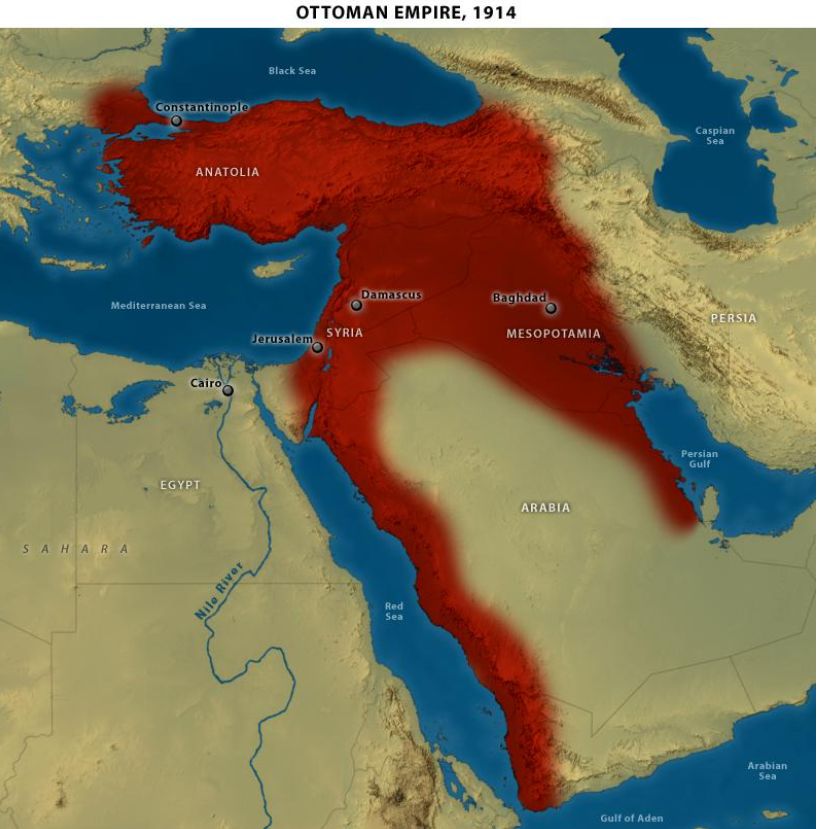
As Churchill put it,
British officers who had served with Faisal were
deeply embarrassed to see their former comrades’ thrashed and trampled down. But
there was also a specific relief that the French had extinguished the fiercest
source of agitation in the Arab world. French resentment against the British
over the affair proved long-lived. 39
If Syria had been a diplomatic embarrassment, it proved much less of a
political headache than Iraq, whose future became the source of acute
controversy. In 1918 Iraq was ’a ruinously neglected semi-desert, semi-swamp of
171,599 square miles. Its population of three million inhabitants was a
festering agglomeration of sectarian and social rivalries.’ 40 It was by far
the most expensive British commitment in the Middle East. In September 1919,
there were still 25,000 British and 81,000 Indian troops in the country, the
size of the garrison partly reflecting the Turkish threat to Mosul. But there
were also inefficiencies which the press soon picked up on, with The Times
running a campaign for withdrawal. Iraq became a prominent issue in the 1922
election; between 1920 and 1924, something like a national debate was held over
whether Britain should remain. 41 All of this worried ministers sufficiently to
come close to a decision for withdrawal. The cost of garrisoning the country
seemed out of proportion to its value.42 But Iraq was one of Britain’s few
wartime gains, and the Prime Minister was ‘on general principles’ against a
policy of scuttle.
The British were determined not to continue relying on American American oil. The Mosul oil fields were regarded as the
biggest in the world. Imperial oil consumption was estimated to reach 10
million tons, but Persia and the Empire would only produce 2.5 million tons.
Therefore, Britain needed to obtain undisputed control of production. 44
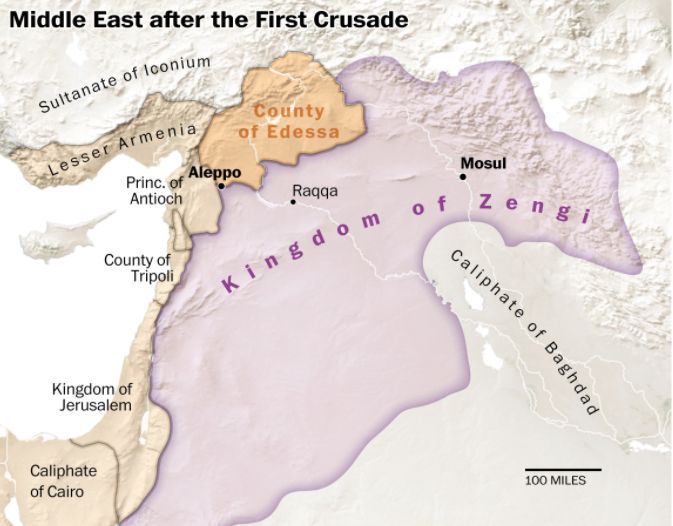
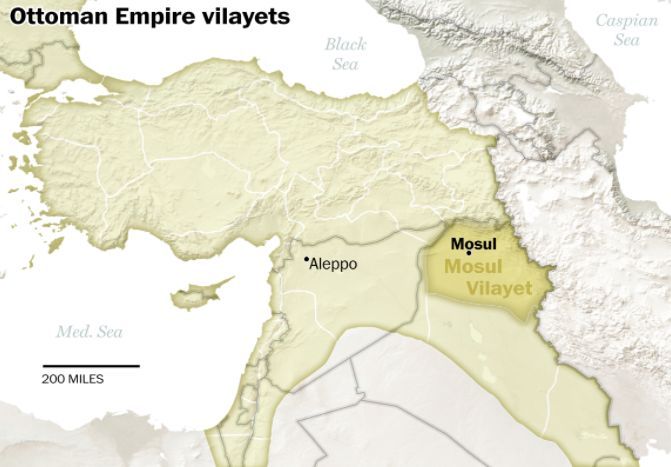
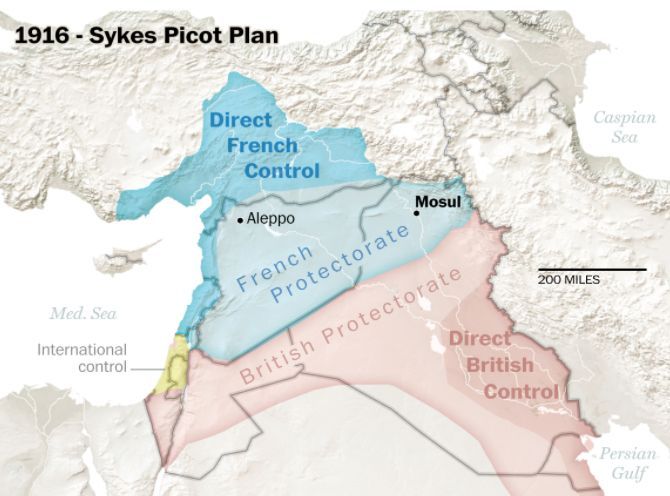
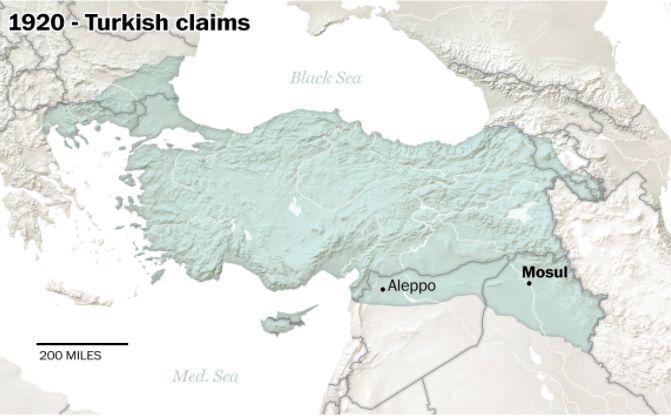
But if British power and influence were to be retained, three key
issues had to be resolved. Should the three former Turkish vilayets of Basra,
Baghdad, and Mosul be ruled directly by Britain or indirectly through a
nominally independent Arab ruler? If the latter, who should that ruler be? And,
most important of all, could all three be welded together as a cohesive, viable
state?
Historically the vilayets had been administered separately, with their
valis directly contacting Istanbul. Iraq had neither a natural capital, a
single administrative system, nor a ruling class. Mosul looked more to Aleppo
and southern Turkey than to Baghdad; Basra had long-established connections
with India and the Gulf, while Baghdad was the center of the Persian
transit trade. A unitary state, an awkward creation at best, would have to be
imposed against the wishes and traditions of the individual provinces. In
addition to the sectarian divisions previously noted, some 600,000 Kurds had
been added to the Mosul vilayet. However, the nearest common denominator was
the Arabic language, which the Kurds did not speak. 44
Although there had been early talk during the war of annexing Basra, by
1918, it had become clear that thanks to Woodrow Wilson, taking over the
country was no longer a political option. However, this message had not gotten
through to the man on the spot. The Acting Civil Commissioner, Lt-Colonel
Arnold Wilson, was a determined proponent of direct rule. Wilson stands as the
Middle Eastern prototype of the British official failing to adapt to changing
times in the Middle East. Described by his biographer as a late Victorian, this
highly energetic Indian army officer was an unabashed imperialist who wanted to
see a protectorate established in Iraq. Like Cromer in Egypt, he had little
time or understanding of local nationalism. As Wilson saw it, the country was
neither ready for self-government nor indeed wanted it. The average Arab, as
opposed to the ‘amateur politician’ in Baghdad, he conveniently believed, saw
the future in terms of fair dealing and material and moral progress under the
aegis of Great Britain. Install ’a honest Arab government’ in Mesopotamia was
impossible; if Britain attempted to do so, ‘we shall abandon the Middle East to
anarchy.’ 45
The more perceptive Gertrude Bell did not share this view. She was once
described as the most powerful woman in the British Empire. There was little
competition does not detract from her actual accomplishments. The first woman
to take a First in Modern History at Oxford, she was a
distinguished traveler and prewar intelligence officer in the Middle
East, plus a translator of the Persian poet Hafez. On her death in 1925, one
nationalist Iraqi paper praised ‘the true sincerity of her patriotism, free
from all desire for personal gain, and the zeal for the interests of her
country which illuminated the service of this noble and incomparable woman,’
citing her as ‘an example to all men of Iraq.’ 46 Bell, who had her ear much
closer to the ground than Wilson, believed nationalism was gaining unstoppable
momentum. From London, Hirtzel warned that Wilson appeared to;
be trying impossibly to turn the tide instead of guiding it into the
channel that will suit you best. Whether you like it or not, you will have an
Arab state […] it is of no use to shut one’s eyes to the main facts. We must
adapt ourselves and our methods to the new order of ideas and find a different
way of getting what we want. And again, echoing Young, ‘is it not better to do
voluntarily what one will sooner rather than later be compelled to do?’ 47
But if more far-sighted officials did not like Wilson’s approach,
ministers were dangerously slow to impose their more realistic ideas on the
Civil Commissioner. Disagreements between departments, the British and French,
and the delay in making peace with Turkey all contributed to procrastination.
48
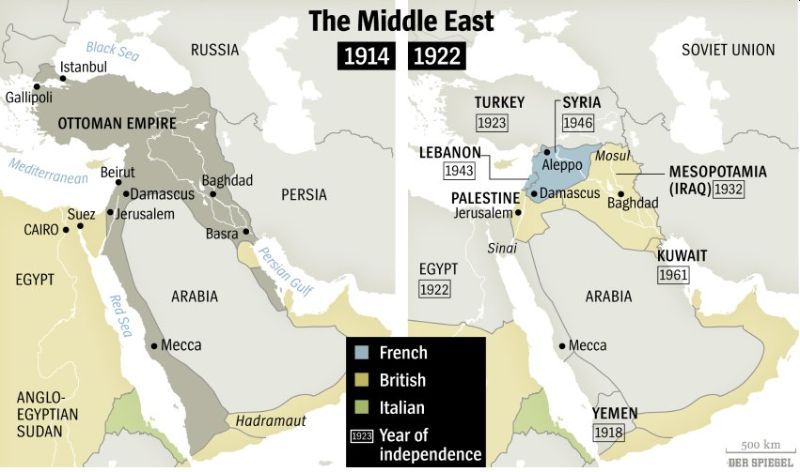
This allowed tribal unrest to boil over into a major revolt in 1920.
Iraq was a traditionally rebellious society, with many arms left over from the
Ottoman era. The immediate causes of this revolt were complex, in part local,
resulting from nationalist propaganda emanating from Syria.
During Shia’s
demonstrations against the advance of ISIS in Iraq in 1914, pitchforks, symbols
of the 1920 revolt, were brandished. 49
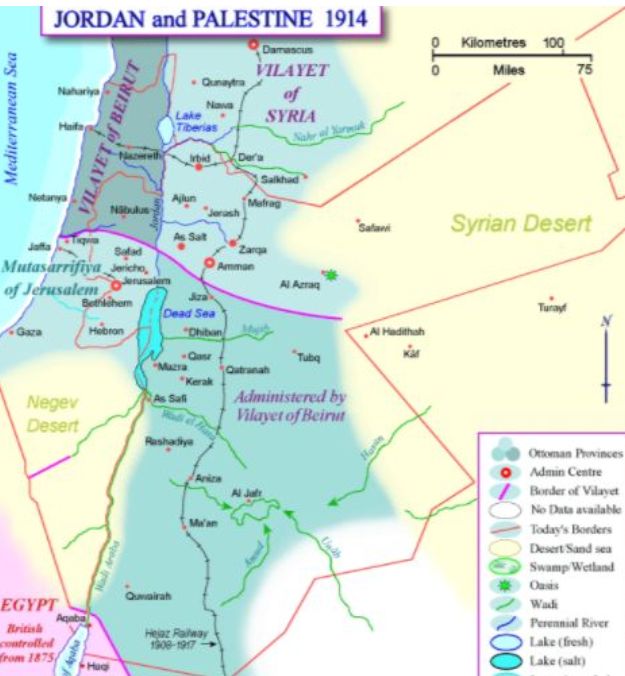
One of the revolt’s most lasting damaging consequences was to bring the
old differences between Sunni and Shi’a back to the surface. 50 Wilson left
Baghdad in 1920 to be replaced by Sir Percy Cox. Cox could sit through hours of
small talk, a patient, determined, insightful man, gradually steering the
conversation in the direction he wanted. Faisal’s biographer describes him as
having an unparalleled knowledge of Arab affairs and ‘the rare ability to see
into people’s motives from a radically different culture.’ 51 His instructions
were both to appease the nationalists and preserve British influence. He
immediately implemented a policy of handing over control to a provisional Arab
government with British advisers while continuing to exercise authority over Iraqi
ministers, which was no less accurate for being discreet. The British
objective, in Hirtzel’s inimitably cynical words, was ‘some modicum
of Arab institutions, which we can safely leave while pulling the strings
ourselves, something which won’t cost very much’.52
The British were looking for a king. Churchill believed that British
interests ‘were best served by friendship and cooperation with the party of
monarchy and tradition in the Middle East.’ 53 But they wanted an amenable
ruler, someone content to reign but not rule. They also wanted to avoid a
political system that would provide the majority Shi’a population, who were
hostile to the British, with a political majority.54
Faisal’s new kingdom
Faisal’s new kingdom comprised all three of the former Turkish
vilayets, which had come under British occupation following Force D’s advance
from Basra in early 1915. In Arnold Wilson’s prescient view, these would not
form a coherent political entity. The Kurds would never accept an Arab ruler,
nor would the Shi’a majority accept domination by the Sunni minority. Moreover,
three-quarters of the country was tribal without a previous tradition of
obedience to any government. Also, the Jewish community dominated Baghdad’s
commercial life and a substantial Christian community, including the
Nestorian-Chaldean refugees from Turkey, and the Assyrians, who had gathered in
Mosul.
Although alternatives were proposed – Lawrence suggested separate
Emirates for Baghdad and Basra – the leading British debate had been whether to
include Mosul in the new state. The problem was its predominantly Kurdish
population. Under the Treaty of Sèvres, signed
in August 1920, the Kurds were initially promised autonomy. Opinion at the
Cairo conference on whether to include Mosul was divided. A strong feeling that
Kurdistan should not be brought under an Arab government and should even be
made into a buffer between Iraq and a resurgent Turkey. The issue was also
hotly contested in parliament and in The Times. But if Mosul was to be
independent, Iraq’s future was economically and strategically compromised.
Mosul was essential to Iraq for its oil potential and as an important
grain-growing area and rendering the rest of the country militarily much more
defensible. In the end, the economic and strategic factors were judged as
outweighing this important further addition to Iraqi heterogeneity.
Palestine raised the even more tricky question of whether to confirm
wartime policy. The risks were now becoming more evident. In June 1919, the
Military Administrator, Sir Arthur Money, warned that fear and distrust of
Zionist aims were growing daily. A British mandate on the lines of the Zionist
program would require the indefinite retention of a military force considerably
more significant than those currently in the country. When Gertrude Bell
visited Palestine in the autumn, she found that Zionism was virtually the only
subject of discussion in Jerusalem.
All the Moslems are against it and furious with us for backing it, and
all the Jews are for it and equally fierce with us for not supporting it enough
[…] I believe that if both [sides] were responsible, they would be each of them
have not very much to fear. But they won’t be reasonable, and we are sowing the
seeds of secular disturbance as far as I can see.
The first riots occurred in April 1920. Yet neither warnings from those
on the spot, nor the calls from the Northcliffe press to drop responsibility
for Palestine, nor even the doubts of the Foreign Secretary, Lord Curzon, who
believed that Palestine would prove ’a rankling thorn’ in the flesh of the
mandatory power, led to a reversal of policy. There was still the hope that
Jewish – Arab tensions would diminish over time, not least once the economic
advantages of Jewish immigration became clear. The French and Italians might
step in if Britain gave up the mandate. Besides, a public commitment had been
made, which the government felt honor-bound to fulfill. In Lloyd George’s
words in 1921, any retreat would ‘damage Britain’s reputation in the eyes of the
Jews of the world.’
The Balfour Declaration (more about this in an upcoming three-part
article) was duly written almost verbatim into the preamble to the mandate, which
alluded explicitly to ‘the historical connection of the Jewish people with
Palestine.’ Britain was obliged to secure the new Jewish homeland and use its
best endeavors to facilitate Jewish immigration and encourage Jewish
settlement of the land. Hebrew was recognized as an official language, and a
Jewish Agency was established to cooperate with the mandatory authorities in
developing natural resources and the operation of public works and utilities.
The mandatory award did not refer to the Arabs. In contrast to the Iraqi
mandate, the British were invested with the full power of legislation and
administration. There was, in other words, no obligation for the British to
ensure self-government, which could only have been based on an Arab majority.
Geographically, however,
the newly mandated Palestinian territory was considerably smaller than the
Zionists had hoped. As agreed with the French in December 1920, the borders cut
the country off from all its most crucial potential water resources, including
the Litani, the northernmost sources of the
Jordan, the spring of Hermon, and the more significant part of the Yarmuk rivers. They also left Palestine without
natural geographical frontiers, a problem which was to have significant
repercussions when Israel gained independence. Also, the territory to the east
of the River Jordan was hived off by an Arab ruler.
Mosul and the importance of
oil.
Amid the discussions before the Inter-Allied Commission on Mandates in
Turkey left, on February 15, 1919, Clemenceau proposed a quid pro quo to Lloyd
George. France would agree to scrap Sykes-Picot and formally cede both Mosul
and Palestine, so long as Britain would give France the mandate for greater
Syria and a quarter of the oil production of Mosul, which would be brought to
market via pipelines to be constructed in French Syria. Yet, Lloyd George,
unwilling to give up the Faisal card, refused to yield.
However, then, forwarded on 20 March to the Political, Economic, and
Military Sections of the Delegation, Sir Louis Mallet of the Foreign Office and
Sir Arthur Hirtzel of the India Office, the Intelligence Department
of the Naval Staff produced a report on Middle Eastern oil, arguing that
control of Mosul and its oil should be a British objective.
A detailed description of the prospects of finding oil in this region
was given. Most of it had yet to be surveyed, but there were good reasons to
think it was a single oilfield, split by the Turkish-Persian frontier. There
was supposed to be oil close to Baghdad and around Mosul. As the Persian and
Mesopotamian oilfield was a single structure, they should be developed as such.
In Persia, British rights were well established; the situation in Iraq was less
clear-cut. Political stability in Mesopotamia was required with a government
that was friendly, or at least neutral, towards Britain.
Thus after the war, Britain
had several reasons to want the League of Nations mandate over Iraq, but oil
was the main reason it wanted Mosul to be part of Iraq. France, Italy, and the
USA were also interested in Mosul’s oil.
A British-controlled concession in Turkey was not as good for Britain
as oil in Iraq. It was more critical that oil should be in territory controlled
by or friendly to Britain than that concessions should belong to British
companies. Archival evidence shows that oil motivated Britain’s desire that
Mosul should remain part of Iraq.
Various disagreements
delayed an Anglo-French oil agreement, but one was finally signed at San Remo in 1920. It was followed by the
Treaty of Sèvres with the Ottoman Empire,
which appeared to give Britain all that it wanted in the Middle East.
Meeting at San Remo in
1920
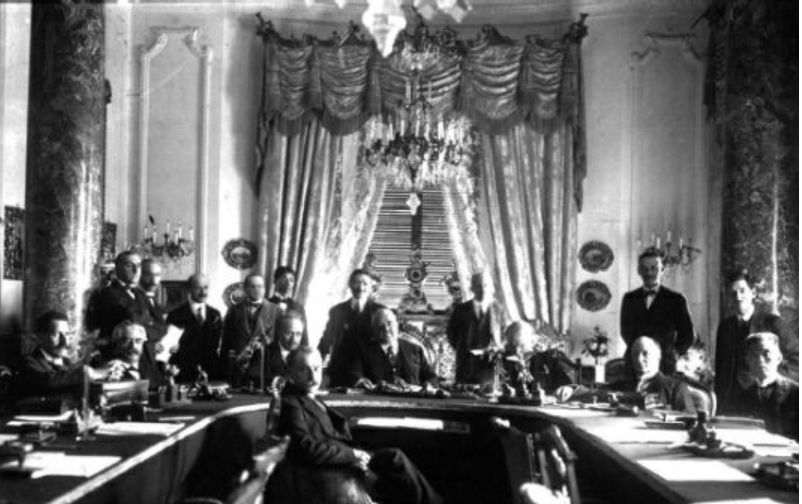
The resurgence of Turkey
under Mustafa Kemal meant that a new treaty had to be negotiated at Lausanne in 1923. Serves angered the USA
since it appeared to exclude US oil companies from Iraq. For a period, Britain
focused on the need to have a sizeable British-controlled oil company. Still,
it was eventually realized that control of oil-bearing territory was more
important than companies’ nationality. This allowed US oil companies to be
given a stake in Iraqi oil, improving Anglo-American relations.
Britain’s need for oil meant it had to ensure the Treaty of Lausanne
left Mosul as part of the British mandate territory of Iraq. Turkey objected,
but the League of Nations ruled in favor. Britain had other interests in the
region. Mosul’s oil gave Britain secure supplies and revenue, making Iraq
viable without British subsidies.
The British had managed to camouflage the oil issue during their
campaign in the League of Nations for Mosul to be attached to Iraq – a claim
hotly contested by the Turks – by making their case on ethnic grounds. Having
been awarded Mosul, the Iraqis were pressured into making the oil concession by
holding it as a precondition for the election of Iraq’s first parliament. But
with the Americans determined to prevent Britain from establishing a monopoly,
London failed to obtain a majority shareholding in the company for British
national groups. ‘We shall probably have to let in the Americans somehow,’ one
official had written in 1921. ‘But we should prefer to do it as an act of grace
rather than compulsion.’
Britain nevertheless exerted considerable influence over the company
because it was registered in Britain and had a British chairman.
Iraqi willingness to accede to so many demands reflected the
government’s heavy dependence on British assistance, most notably for security.
The ‘sheet anchor’ of British power lay not in the threat to intervene
militarily but instead, as Dobbs noted, to withhold military intervention.
There was constant trouble in the southern provinces and Kurdistan. Until the
final settlement of the Mosul dispute in 1925, the northern province was
threatened by Turkish irregular units. Ikhwan raiding from Ibn Sa’ud’s Najd kingdom continued for seven years in the
southwest. This desert war, which had begun in 1924, reflected one of the
difficulties of translating European notions of sovereign states with fixed
frontiers into a region of nomadic tribes, whose very existence depended on
their ability to migrate and graze freely. But the early raids also reflected
the deep-seated hostility between Ibn Sa’ud and
the Hashemites.
The key to controlling these various conflicts was airpower. Lawrence
had believed that aircraft ‘could rule the desert.’ Despite early technical
problems, a political coalition between the RAF, anxious for a peacetime role
to justify its continued existence as an independent service, and the
politicians, led by Churchill, desperate to reduce costs in Iraq, ensured that
air power became a covert means of pursuing empire in an increasingly
anti-imperial age. The Colonial Secretary was perhaps the only minister willing
to gamble on turning such a large state over to a new, still largely untried,
method of imperial control. First deployed in the early 1920s, it became the
leading British instrument for ensuring order until Iraqi independence in 1932.
Its value to the insecure, fledgling Iraqi government is attested by the fact
that between August 1921 and 1932, the RAF came to the government’s
aid on 130 occasions.
Its long-term value to the British was also substantial. Iraq provided
the RAF with operational training and a distinctive role. In his study of
airpower and colonial control, David Omissi credits
Iraq with facilitating the independent survival of the Service, which had only
been formed in 1918 and still faced opposition from the navy, army, and
Treasury, thereby helping ensure British victory in the Battle of Britain in
1940. The Iraqi experience also lies behind the strategic bombing campaign of
World War II, affording the RAF, including the future head of Bomber Command,
Air Chief Marshall Sir Arthur Harris, with their only significant experience of
bombing before 1939. Airpower was cheap, quick, flexible, and ideally suited to
a large country with poor communications. It was particularly effective against
tribal dissidence and border encroachments while allowing control of remoter
regions without the expense of occupation. Warnings were typically given, and
according to at least one officer, aircraft did not generally inflict hefty
casualties. Still, they achieved a moral effect by engendering a feeling of
helplessness among tribe members unable to reply effectively to the attack.
Squadron-Leader Harris, as he then was, wrote that both Arabs and Kurds knew
that ‘within 45 minutes a full-scale village can be practically wiped out and a
third of its inhabitants killed or injured. Despite official instructions, air
control was also used to enforce revenue collection, sometimes becoming a
substitute for good administration. It was quicker and easier to send aircraft
than to investigate disputes and grievances on the ground.
Similarly, it was easier to bomb the Kurds than to make political
concessions. Either way, air control did not encourage the Iraqi government to
develop more peaceful means of extending control over its territory. But Leo
Amery’s verdict of 1925, that was the airplane ‘removed tomorrow, the
whole [Iraqi] structure would inevitably fall to pieces,’ appears to have been
close to the mark.
Iraq, however, needed forces of its own; according to the 1922 treaty,
it was to take over responsibility for internal security and national defense
within four years. Faisal wanted to introduce conscription, but the British
objected, preferring the creation of a minor, professional mobile army.
Conscription promised poorly trained troops and threatened to divert funds from
roads and railways essential to Iraqi development and British military mobility
in the country. But there were two other reasons for the British opposition. A
large army could become the instrument of a government with despotic
aspirations. The other touched on one of the fundamental weaknesses of the new
country. Whereas Faisal looked to conscription as a means of nation-building,
the British realized that it would be highly unpopular with the majority Shi’a
community; they had no wish to become involved in any consequent enforcement
activities for which they would then be blamed.
The Iraqis suspected the real reason for British objection was that
they did not want a powerful Iraqi army. In addition to security, mandatory
Iraq also needed British financial help and administrative expertise, at least
in the early years. According to de Gary, ministers depended on their
advisers for unbiased opinions and hard and quick work. While the numbers of
British advisers more than halved between 1923 and 1931, they proved a potent
source of Anglo-Iraqi friction. Stephen Longrigg,
Inspector-General of Revenue, later wrote of ‘an adolescent society and
government impatient to be rid of foreign control, condescension, and wiseacre
advice, which its politicians never wholly trusted and frequently
misunderstood.
Every order and measure within a ministry had to pass through the
Adviser before gaining a ministerial signature. If the Adviser objected because
it was contrary to the treaty or good administration, the matter was raised
with the High Commissioner, who in extreme cases ‘advised’ the King against it.
A particular Iraqi term, al-Wadha al-Shade, translated as ‘perplexing
predicament,’ was invented to describe this much-resented system of dual
responsibility.
As in Egypt, the High Commissioner would at times intervene over the
appointment of ministers. Cabinets, therefore, tended to be dominated either by
conservative elements or by young Iraqis willing to work with Britain. Iraqis
coined the sarcastic epithet Mukhtar dhak al-Staub for the High
Commissioner, loosely translated as boss on the other side of the River Tigris
from the prime minister’s residence. Iraqi frustration with the mandate was
captured by the poet Ma’ruf al-Rasafi:
He who reads the constitution will learn that it is composed according
to the mandate. He looks at the flapping banner and finds that it’s billowing
in the glory of aliens. He enters the Ministries will find that the chains of
foreign advisers shackle them.
Much to Dobbs’s annoyance, Faisal
was constantly trying to chip away at British privileges, to the point that by
1928 the two men could barely tolerate being together. Faisal’s aim, however,
was not complete British disengagement, something he knew he could not afford,
but an end to the High Commissioner’s interventions in Iraqi internal affairs.
The British were partially responsive. They could not afford a discontented
Iraq and recognized the growing risk that the continuation of the mandate would
undermine Faisal’s credibility on which they ultimately depended. Hence, they
were, therefore, willing at least to loosen their control. But a new treaty in
1927 failed to provide the concessions Faisal wanted. Two years of haggling and
one tragedy followed. In 1929 the Iraqi prime minister, ‘Abd al-Muhsin al-Sa’adoun, committed suicide. In the note he left for his
son, he wrote that the Iraqis are weak, powerless, and far from independence.
They are incapable of accepting the advice of honorable people such as me. They
think I am a traitor to the country and a slave of the English.’
Eventually, the treaty, eventually signed in 1930, provided for de
jure, if not de facto, Iraqi independence. Britain retained two rent-free
airbases and relocated away from Baghdad and Mosul to reduce friction with
nationalist circles. There would be mutual help in times of war, including the
right to transport troops across Iraq. Iraq would continue to buy military
equipment from Britain, employ at its expense the services of the British
military mission, and send its officers exclusively to British military
academies. There was a ‘full and frank’ consultation on all foreign policy
questions concerning their common interests. Iraq should normally employ
Britons in posts held by non-Iraqis, thus continuing to give Britain
considerable latitude in defense and administration. Britain, however, ceased
to have any responsibility in internal affairs, which meant that the RAF would
no longer help with internal security. The High Commissioner became an
ambassador, though with a higher status than other foreign envoys. Close
contacts with the government continued. As of September 1932, the ambassador
paid at least one weekly visit to the King, while the Prime Minister typically
paid a weekly visit to the embassy.
Iraq had agreed to these terms because it wanted admission to the
League of Nations and the assurance of continued British military support
against external attack. The treaty, nevertheless, met with widespread
opposition. Many Shi’a feared that independence was a prolog to mass
conscription; Kurds feared subordination in a predominantly Arab state. The
League of Nations had been uneasy about Iraq’s intolerant policy towards its
minorities. When the League had awarded Mosul to Iraq in 1925, it had demanded a
25-year Anglo-Iraqi treaty to guarantee Kurdish rights. Dobbs had once
described the Kurds as ‘the sheet-anchor of British influence in Iraq. There
was also concern about the positions of the Assyrians, a Christian group who
had come from Turkey after World War I. Many served in the Levies, an imperial
rather than an Iraqi force, which the British regarded as more efficient and
reliable than the Iraqi army, and which were used to guard the RAF bases.
British attempts to intervene with the Iraqi government on behalf of both
minorities were consistently rebuffed. The British were anxious to conceal from
the League of Nations Permanent Mandate Commission. This cover-up allowed Iraq
to become the first mandatory territory to be admitted to the League of Nations.
For the Iraqis, it was an important symbol of equality. To French displeasure,
it also provided a potential precedent for Syria and Lebanon.
The mandatory period of Anglo-Iraqi relations had lasted barely more
than a decade. The British had provided a ruler, parliament, and a
Western-style constitution. They had provided the government and country with
vital security and helped establish an administration. They had also helped
ensure that Mosul, where oil was found in 1928, remained Iraqi. But they had
not provided significant resources for economic development. In Iraq, as
elsewhere in the Middle East, the Treasury was ungenerous. There had been
minimal investment in education because it would be dangerous to educate young
people with no prospects for employment. In 1932 there were fewer than two
thousand secondary school places in Iraq.
Nor had the British helped to provide their awkward creation with
something even more important, namely a political culture that might allow it
to transcend its multiple divisions; indeed, to some extent, the British had
hindered this development. Since Iraqis were never given real responsibility in
government and regarded the constitution as an instrument of foreign control
and manipulation, the constitution never took root. Parliament was not
representative of the country but instead of those groups, notably the tribal
sheiks, whom the British had sought to bolster. At the same time, the
government was conducted to benefit the Sunni urban elite. In 1937 the British
ambassador described elections as a ‘dumbshow.’ This undemocratic distribution
of power could only serve to deepen the ethnic and religious divisions which
Iraq had inherited.
Sir Henry Dobbs had few illusions. ‘My hope,’ he had written in
retirement in 1929;
is that, even without our advice, Iraq may now be so well established
that she may be able to rub along in a corrupt, inefficient, oriental sort of
way, something better than she was under Turkish rule […] If this is the
result, even though it may not be a very splendid one, we shall have built
better than we knew.
He was over-optimistic. The end of the mandate was followed by a period
of instability, with religious and ethnic groups asserting their claims to
greater autonomy, renewed tribal unrest in the south, and a distinct sense of
disillusion with the constitutional system. Between 1936 and 1941, there were
no less than seven military coups.
The 1930s saw a notable decline in British influence, and one senior
British official complained, the treaty failed to ‘bring us the credit of
friendship we might have acquired by leaving Iraq altogether – but at the same
time – did not bring us power and control which we set out to secure.’ Faisal
died in 1933. Despite being educated at Harrow and having a taste for Savile
Row suits, the young King Ghazi, who, like Farouk in Egypt, was very much the
playboy prince, strongly resented British influence. In July 1936, the Foreign
Office was considering forcing his abdication. The following year he opened a
radio station, a gift from Hitler, in his palace. It attacked Zionism and
British influence in the Gulf. His death in a drunken road accident in 1939 was
widely attributed to the British, a theme played up by German radio. Ghazi’s
views were representative of a younger nationalist generation, who resented the
lack of complete independence, and were influenced by the Arab revolt in
Palestine. They saw the British as an obstacle to Arab unity and looked to
European fascism as a successful new social model. Fascist ideas appealed to
young army officers, who disliked continued British control. They saw Germany
as an example of how the army could become a ‘school for the nation’ and a
vanguard of liberation from colonialism. Alignment with the Axis offered a
means of liberating Iraq from dependence on Britain.
Arms supplies were a particular bone of contention. Under the 1930
treaty, Britain was obliged to sell the modern arms the Iraqis needed. But the
requests made in the 1930s were not all met. In 1936 the Foreign Office was
chary of a proposal to double the Iraqi air force, making it superior in
numbers and quality to the RAF. However, the main problem was the slow pace of
the British rearmament. The Iraqis could not believe that a Great Power would
be unable to supply their needs and suspected that they were deliberately kept
short of arms. The delivery of German and Italian weapons in 1937, in clear
breach of the 1930 treaty, facilitated Axis penetration of the armed forces.
Senior Iraqi military figures visited Germany, establishing ties with German
firms. Indeed by the mid-1930s, the German minister, Fritz Grobba, who had a good command of Arabic and Turkish and a
deep knowledge of the region, was beginning to take on the British embassy’s
social and political role. A British embassy report of April 1939 spoke of the
Germans’ pouring money into Iraq. The ambassador, Sir Maurice Peterson, found
himself powerless to do much more than issue warnings to the Iraqis.
The 1930s also witnessed
the emergence of another problem which was to cause considerable trouble in
future years. Following independence, Iraq laid claim to neighboring Kuwait. It
did so because it was a successor state to the Ottoman Empire and of the Anglo-Ottoman Convention of 1913, which had stipulated
that Kuwait was an autonomous district of the Empire and the sheik an Ottoman
official. Even though the convention had remained unratified, Turkey had
renounced all claims under the 1923 Treaty
of Lausanne, and Iraq had in 1932 accepted the Iraqi-Kuwaiti border. The
Iraqis pursued their case through a propaganda campaign, support for dissident
elements in Kuwait, and border incursions. All this was successfully opposed by
Britain, which was responsible for the defense of Kuwait, and was already
eyeing the sheikhdom as an alternative should they lose their Iraqi bases. But
opposition came at the cost of further undermining Britain’s position in Iraq.
The Arab question and the
‘shocking document’ shaped the Middle East.
Showing things were not going too well, Britain’s defeat at Gallipoli
was followed by an even more devastating setback in the war against the
Ottomans: The Menace of Jihad and How to Deal with It.
French rivalry in the Hijaz; the British attempt to get the French
government to recognize Britain’s predominance on the Arabian Peninsula; the
conflict between King Hussein and Ibn Sa’ud, the
Sultan of Najd; the British handling of the French desire to take part in the
administration of Palestine; as well as how the British authorities, in London
and on the spot, tried to manage French, Syrian, Zionist and Hashemite
ambitions regarding Syria and Palestine. The ‘Arab’ and the ‘Jewish’ question.
The British authorities in Cairo, Baghdad, and London steadily lost
their grip on the continuing and deepening rivalry between Hussein and
Ibn Sa’ud, in particular regarding the
possession of the desert town of Khurma. British
warnings of dire consequences if the protagonists did not hold back and settle
their differences peacefully had little or no effect. All the while, the
British wanted to abolish the Sykes-Picot agreement - the Syrian question.
One of the most far-reaching outcomes of the First World War was the
creation of Palestine, initially under Britain as the Mandatory, out of an
ill-defined area of the southern Syrian boundary of the Ottoman Empire. The
true history of the Balfour Declaration and its implementations P.1.
The true history of the
Balfour Declaration and its implementations P.2.
The true history of the Balfour
Declaration and its implementations P.3.
The combine
footnotes from the previous part two and the
above.
1. Christine Riding, ‘Travellers and
Sitters: The Orientalist Portrait, in Nicholas Tromans and
Rana Kabbani (eds), The Lure of the East (London, 2008), p. 61.
2. D. K. Fieldhouse, Western Imperialism in the Middle East 1914-1958,
2008, p. 69.
3. Eleanor H. Tejirian and Reeva
Spector Simon, Conflict, Conquest, and Conversion: Two Thousand Years of
Christian Missions in the Middle East, 2012, p.183.)
4. Not mentioned in the London Gazette: see both censored and
uncensored versions of Allenby’s report for the London Gazette, preserved in
PRO, WO 32/ 5128.
5. Cited in James Barr, A Line in the Sand: Britain, France, and the
Struggle That Shaped the Middle East, 2011, 61– 62.
6. Cited in David Fromkin, A Peace to End All Peace: The Fall of
the Ottoman Empire and the Creation of the Modern Middle East, 2001, 377.
7. Christopher Catherwood, Churchill’s Folly (New York, 2004), p.
119.
8. Margaret MacMillan, Peacemakers: The Paris Peace Conference of 1919
and Its Attempt to End War,2001, p. 392.
9. Henry Foster, The Making of Modern Iraq (London, 1936), p. 87.
10. Ephraim and Inari Karsh, Empires of the Sand (Harvard, 1999), p.
261. Helmut Majcher, Imperial Quest for Oil: Iraq, 1910– 1928 (London,
1976), p. 177.
11. John Marlowe, Late Victorian: The Life of Sir A. Talbot Wilson
(London, 1967), p. 134.
12. Macmillan, Peacemakers, p. 297.
13. Shareen Blair Brysac and
Karl E. Meyer, Kingmakers: The Invention of the Modern Middle East, p. 144.
14. D. K. Fieldhouse, Western Imperialism in the Middle East 1914-1958,
2008, p. 69.
15. Peter Sluglett, ‘An Improvement on
Colonialism? The “A” Mandates and their Legacy in the Middle East’,
International Affairs, March 2014, p. 414.
16. British Documents on Foreign Policy, Vol. xiii (London, 1963), p.
264.
17. Erik Goldstein, British peace aims and the eastern question: the
political intelligence department and the Eastern Committee, 1918, Middle
Eastern Studies, Volume 23, 1987 - Issue 4, p. 424.
18. John Darwin, Britain, Egypt and the Middle East (London, 1981), p.
134. British Documents on Foreign Policy, Vol. iv, p. 343.
19. David Fromkin, A Peace to End All Peace: Creating the Modern
Middle East, 1914-1922, 1990, p. 385.
20. Ibid., p. 470. Christopher Catherwood, Churchill’s Folly: How
Winston Churchill Created Modern Iraq, 2004 p. 72. John Townsend, Proconsul to
the Middle East (London, 2010), p. 182.
21. Briton Cooper Busch, Britain, India and the Arabs, 1914-21,1971 pp.
272– 3.
22. Macmillan, Peacemakers, p. 416.
For updates click hompage here